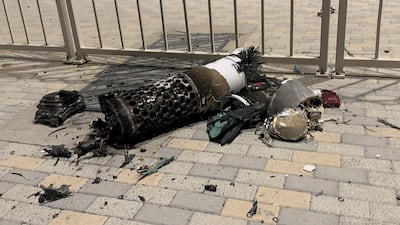Iran is exhausted. At last. Again.
War weary and feeling defenceless, it has once more been forced into accepting a ceasefire with an enemy. History does not repeat itself exactly, but as the saying goes, it often rhymes.
When Ayatollah Ruhollah Khomeini agreed to a ceasefire with Iraq in 1988, he famously described it as “worse than drinking poison”. The octogenarian leader, who died a year later, urged Iranians to accept his decision and be grateful for the sacrifices of the war. One million lives were lost in the eight-year conflict.
It was a moment of deep humility for a regime born in defiance. The Islamic Republic’s dream of swiftly exporting its 1979 revolution through the battlefield collapsed under the weight of economic strain, human cost and strategic overreach.
Now, four decades later, another poison pill is being passed around in Tehran. This time, it is the 86-year-old supreme leader, Ayatollah Ali Khamenei, confronting the bitter taste of necessity. The recent ceasefire with Israel feels like deja vu, but with higher stakes and broader regional implications.
After the war with Iraq, the establishment adopted a policy of “forward defence”, projecting power beyond its borders to prevent future wars at home. What began as a shield became a spear. Over time, Iran’s ideological mission turned into geopolitical ambition: proxy militias; missile stockpiles; covert operations; and a nuclear programme. What was once a doctrine to protect the revolution evolved into a campaign to dominate parts of the region.

To some extent, it worked. Iran came close to building a strategic arc of influence from Tehran to the Mediterranean. But the latest conflict has exposed the limits of that strategy. The myth of invulnerability was shattered in a matter of hours. Tehran’s deterrence was tested and found wanting. The old playbook of raising the stakes then stepping back with a calculated calm no longer worked.
Tehran was caught off guard, assuming war was off the table as it pursued nuclear negotiations with the US. Instead, it was hit hard. It retaliated swiftly, unleashing a wave of devastating missile strikes on Israeli cities. For the first time, both cities were under direct, heavy fire. No proxies. No buffers.
What began as an effort to contain Iran’s nuclear programme soon revealed a deeper aim: a quiet campaign to destabilise or even shift the balance of power in Tehran. As Iran’s regional alliances crumbled and with Hezbollah overstretched, Syria’s Bashar Al Assad gone and air defences faltering, Israel escalated its operations inside Iran with assassinations and drone strikes. Iran had to defend its own soil, from its own soil. Again.
Sensing an opportunity, the US stepped in. American bombers struck major nuclear sites deep inside Iran, a bold show of support for Israel that stopped short of total war. Iran hit back with a precision strike on a US base in Qatar, sending a message: cornering its ruling class could ignite the whole region. That strike was a warning: Iran may be battered, but it won’t go down quietly and it is ready to defend the Islamic Republic, even at the cost of its regional ties.
Now Tehran faces a new reality in the Middle East, while inside the country, millions of voices are calling for peace, prosperity and rebuilding. They are tired of sacrifice without progress, and slogans without solutions. They want passports that open doors, not raise suspicions. They want to join the world, not fight it.
Iran has long prided itself on thinking 50 years ahead. But is that still true? Or is it stuck, chained to the logic of defiance, even as the region changes? What cards are really left on the table? Oil? Uranium? Ideology? The real card was, and it still is, Iran’s own potential – a young, educated population of 92 million people, vast natural resources, rich culture and strategic geography.
The risk now is that this new poison pill becomes just another loop in an old cycle: lick the wounds; regroup; rebuild for the next round. That would be a mistake. The real lesson is not just restraint – it is to know when to stop, when to pivot and when to listen.







The truth is that much of the Middle East is rooting for a better Iran. Not a weaker Iran, but a wiser one. One that is realistic, co-operative and open. One that sees compromise not as defeat but as a strategy. One that builds strength through trust, not fear.
“With all that clamour, with all those claims, the Zionist regime, under the blows of the Islamic Republic, has almost collapsed and been crushed,” said Mr Khamenei in a defiant speech after the ceasefire. But the reality is far more complex.
His poison pill could turn out to be not a bitter dose for the man at the top, but a potential remedy for the whole nation.


